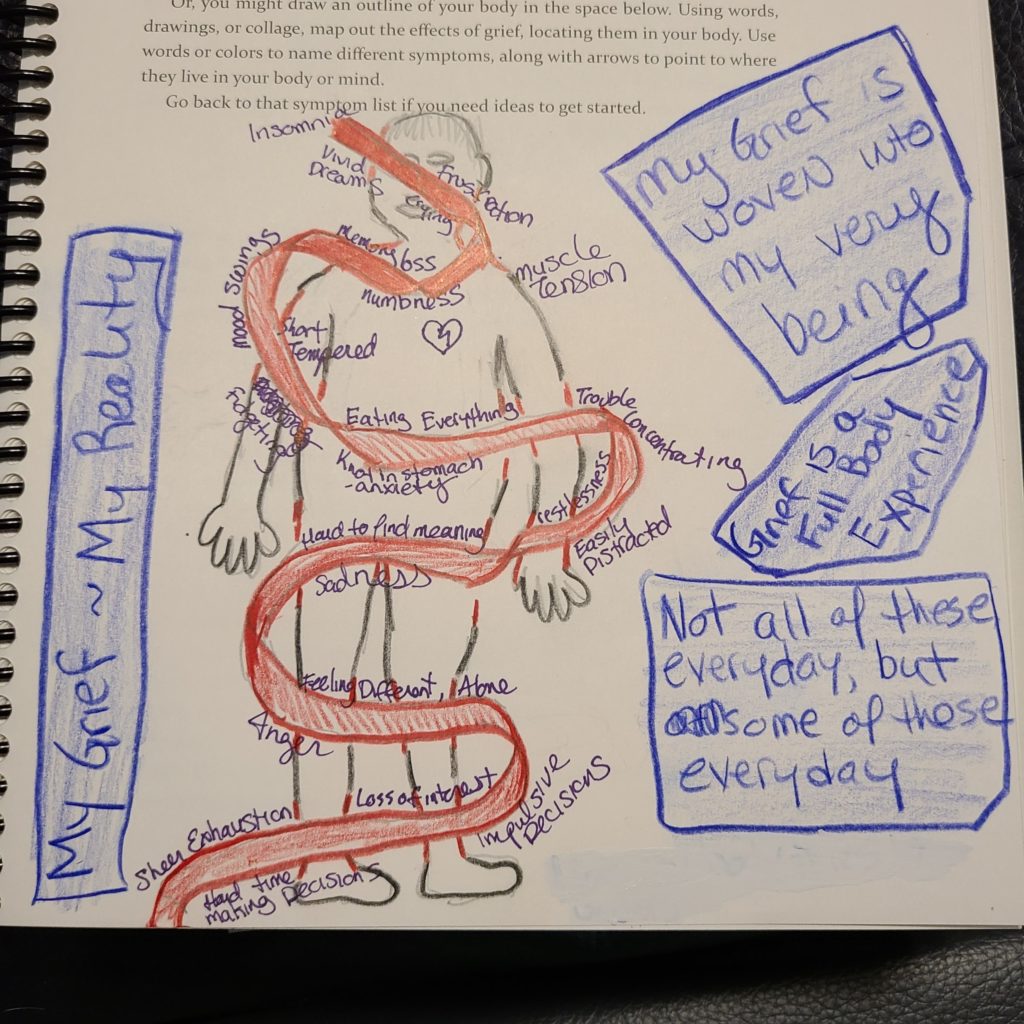
What IS grief? I mean – we all know that grief arises when we lose something important to us – a person, a dream, a pet, a belonging, our health (and the list could continue), but there is also the question of how grief manifests. In the common collective popular messaging, grief looks pretty standard, with two common variations: crying/depression, or avoidance – putting one’s head down and burying themselves in work, for example.
But in real life? In real grief? Crying, depression, and avoidance can certainly be a part of how grief manifests (I’ve certainly written before about the frequent crying I did in the first year after Sara’s death), but there are so many other ways grief can impose upon one’s life.
The image at the beginning of this post is a drawing I did in a response to a prompt about this topic in Megan Devine’s grief workbook, How to Carry What Can’t Be Fixed. My personal grief experience covers a very wide array of things I’ve noticed over the last 2 years (really I started grieving even before George and Sara died – there was some grief involved as soon as Sara was diagnosed).
For me there are physical symptoms:
muscle tension, exhaustion, insomnia, crying, fidgeting/restlessness
And also mental/emotional symptoms:
vivid dreams, frustration, memory loss, emotional numbness, mood swings, anxiety (which I often feel as knots in my stomach), trouble concentrating, being easily distracted, sadness/depression, anger, having trouble finding meaning, loss of interest in things, feeling different/alone, and simultaneously having a hard time making decisions and also making impulsive decisions
Grief truly is a full-body (and full-mind) experience. I know that I generally seem like I have it together, but even 19 months out, I experience some of these every day. Just recently I had to start using a pillbox for one of our dogs because I was repeatedly having trouble remembering if I’d given him his twice a day medicine or not. I’ve never been the most organized person when it comes to to-dos, email, etc., but I’ve REALLY struggle with this in my grief. I’m trying hard to use tools that help me manage this particular challenge, but honestly it creates a lot of daily stress. I’ve not been sleeping well, and I’m learning that many of these symptoms can feed other symptoms; after a couple days of not-enough-sleep I can turn into a sleep-deprived, anxious mess who then turns to procrastination and avoidance to temporarily feel better.
I know many of these symptoms are not necessarily unique to grief – but I guess I just wanted to share this drawing and my reflection on my experience with grief symptoms because honestly it’s easy to feel like you’re losing your mind, especially in early grief. I expected to be sad, but I didn’t necessarily expect to turn into someone who would lose my train of though so much easier than before, and who would feel near-crippling anxiety at realizing I hadn’t followed up on something that was really important to me. Sometimes my grief makes me want to just crawl into a hole and be alone, and other times I want nothing more than to be around other people (which has been hard in a pandemic).